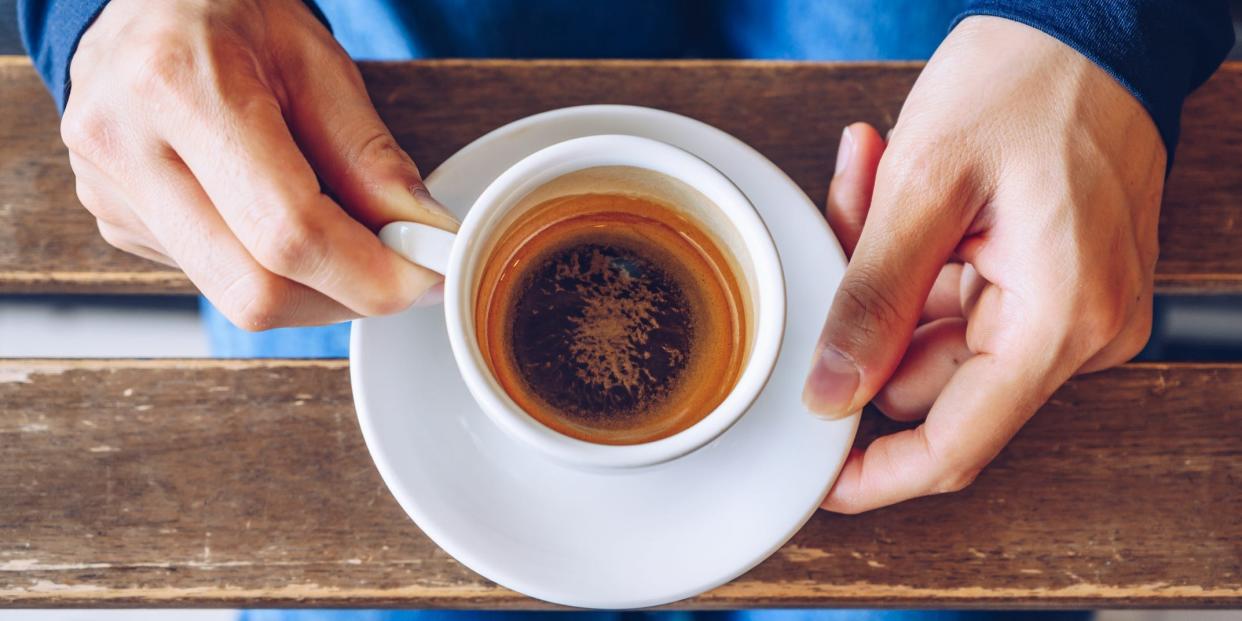Signs you may have a caffeine sensitivity and alternative ways to boost energy

Caffeine sensitivity causes people to feel the effects of caffeine much more intensely.
Symptoms of caffeine sensitivity include headaches, insomnia, anxiety, and jitters.
Alternatives to caffeine are eating a healthy snack, exercising, and drinking enough water.
If just one cup of coffee leaves you jittery, shaking, or anxious, you may have caffeine sensitivity. Caffeine sensitivity can be caused by factors such as genetics and pregnancy. While usually not dangerous, it can be irritating and uncomfortable.
Here's what you need to know about the causes of caffeine sensitivity, its symptoms, and how to treat it.
Understanding caffeine sensitivity
Caffeine sensitivity is when you feel the impact of caffeine quickly or when consuming very little.
"Being sensitive to caffeine can cause people to feel the effects of caffeine much more intensely than someone who is less sensitive," says Morgyn Clair, a registered dietitian nutritionist at Sprint Kitchen. "For some people, one cup of coffee could feel like three or four."
Genetics is one of the main reasons for caffeine sensitivity. An enzyme in your liver is responsible for 95% of the body's metabolization of caffeine. Two forms of this enzyme exist, and carriers for one version may metabolize caffeine slower, thus experiencing its effects for longer.
Additionally, receptors in your brain may have an easier time sticking to caffeine molecules, says Jenna Liphart Rhoads, PhD, a registered nurse, and nurse educator at Nurse Together.
Other causes of caffeine sensitivity
Age: In a 2017 study, instances of caffeine-induced insomnia - when consuming too much caffeine interferes with sleep - increased with age, suggesting caffeine sensitivity in elderly people.
Medications: Taking the medication Theophylline or the herbal supplement Echinacea can increase the effects of caffeine.
Pregnancy: As your pregnancy progresses your body's ability to metabolize coffee decreases between 30% and 70%.
Tolerance: If you have had little or no exposure to caffeine, you will likely be more sensitive to its effects.
Symptoms of caffeine sensitivity
Signs of caffeine sensitivity range from minor irritations to dangerous developments. According to Rhoads, symptoms of caffeine sensitivity include:
While most of these signs are harmless, when symptoms like a racing heartbeat accompany health conditions like heart disease, it can be dangerous, she says.
Important: Symptoms can last between a few minutes and a few hours, depending on how fast the liver metabolizes caffeine, says Rhoads. It can take caffeine up to 10 hours to fully leave your body.
Can you get rid of a caffeine sensitivity?
The answer to whether or not you can get rid of a caffeine sensitivity depends on what caused it.
"If caused by genetics, there is no way to change a caffeine sensitivity. Sometimes consistent caffeine intake will cause the body to become more caffeine tolerant," says Clair. "Most evidence on this is anecdotal, but many people report an increase in tolerance with increased caffeine usage."
However, if you experience severe side effects of caffeine, trying to push a tolerance can be dangerous.
"Avoidance is recommended if there are other health effects present such as high blood pressure or anxiety. Caffeine usage is largely recommended on an individual basis," says Clair.
General advice: Overall, the FDA recommends consuming no more than 400 mg of caffeine per day - the equivalent of about four cups of coffee.
If you have a caffeine sensitivity, you should also avoid foods with caffeine. While caffeine content is often not mentioned on the label, a quick search of specific foods should provide you with the quantity. Foods containing caffeine include chocolate and certain protein bars.
Caffeine alternatives
To limit your caffeine intake, try these caffeine substitutes that will boost your energy:
Eat a snack, specifically one with a healthy carbohydrate paired with fat or protein, like nuts, which will provide a steady flow of energy and keep you satisfied.
Exercise, which can elevate mood and help you sleep better
Drink water, dehydration can cause fatigue.
Insider's takeaway
A person may have caffeine sensitivity due to genetics, age, medications, or pregnancy. Symptoms of caffeine sensitivity include headaches, anxiety, restlessness, and an elevated heartbeat. If you experience intense symptoms, avoiding caffeine may help, but a nutritionist can provide individual care.
Related articles from Health Reference:
Why coffee can be a good drink for weight loss - and how to drink it to help you lose weight
What happens when you eat too much protein, and how much is healthy
How to follow an intermittent fasting schedule with 6 different methods
Yes, eggs can help you lose weight - here's how to eat them as part of a healthy diet
6 easy ways to start eating healthy, according to dietitians
Read the original article on Insider
